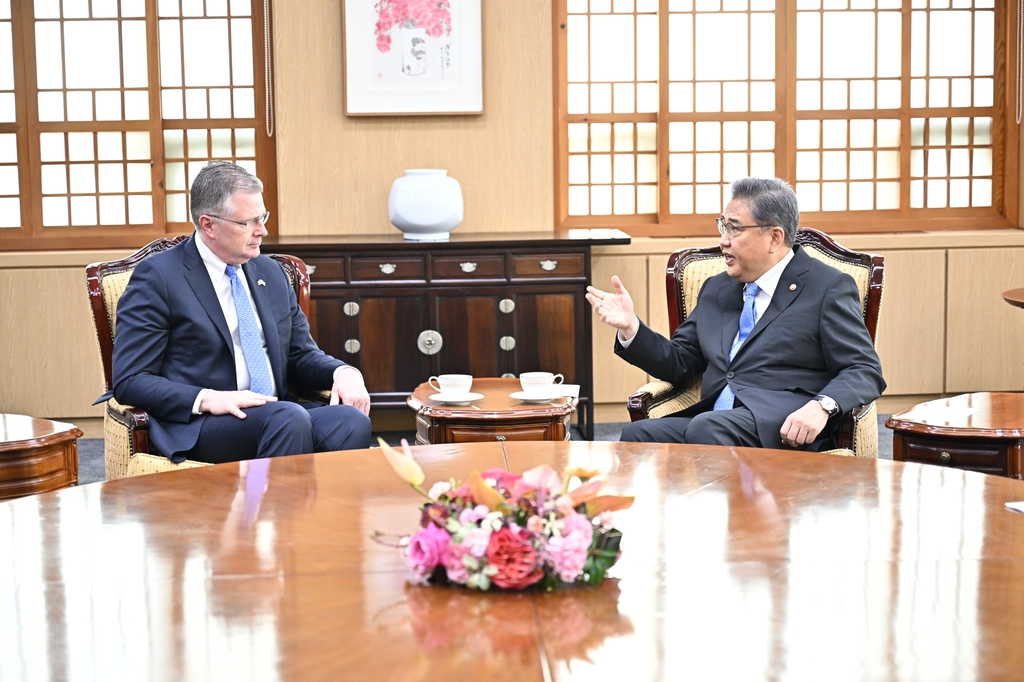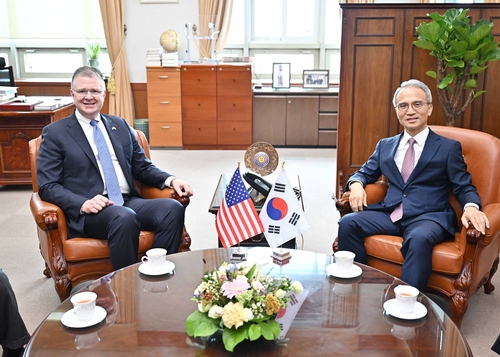- California Assembly OKs highest minimum wage in nation
- S. Korea unveils first graphic cigarette warnings
- US joins with South Korea, Japan in bid to deter North Korea
- LPGA golfer Chun In-gee finally back in action
- S. Korea won’t be top seed in final World Cup qualification round
- US men’s soccer misses 2nd straight Olympics
- US back on track in qualifying with 4-0 win over Guatemala
- High-intensity workout injuries spawn cottage industry
- CDC expands range of Zika mosquitoes into parts of Northeast
- Who knew? ‘The Walking Dead’ is helping families connect
Top U.S. diplomat for East Asia policy holds talks with Seoul officials on trade, alliance
The top U.S. diplomat for East Asia policy held a series of talks with South Korean officials in Seoul on Friday on a wide range of topics, including North Korea policy, trade and the bilateral alliance.
Daniel Kritenbrink, the assistant secretary of state for East Asian and Pacific affairs, met his South Korean counterpart, Yeo Seung-bae, and then paid courtesy calls on Foreign Minister Park Jin and Second Vice Foreign Minister Lee Do-hoon.


South Korean Foreign Minister Park Jin (R) speaks with Daniel Kritenbrink, the U.S. assistant secretary of state for East Asian and Pacific affairs, at his Seoul office on Aug. 26, 2022, in this photo provided by the foreign ministry. (PHOTO NOT FOR SALE) (Yonhap)
During the back-to-back talks with the U.S. diplomat, Seoul officials delivered South Korean businesses’ concerns about the U.S. Inflation Reduction Act, which gives tax incentives only for electric vehicles built in North America, and other pending issues.
Park told Kritenbrink that Washington’s discriminatory treatment of Korean companies could violate the terms of the bilateral free trade agreement and the World Trade Organization’s most-favored-nation treatment principle, according to the ministry.
The top Seoul diplomat highlighted South Korean companies’ massive investment in the U.S. and Seoul’s joining of U.S.-led economic initiatives in trade, critical minerals and semiconductor supply chain, and called for measures by Washington to address their concerns.
“(Park) called for (Washington) to promptly make efforts to come up with possible solutions, including exemption or postponement of such discriminatory acts,” the ministry said in a release.
In closed-door talks, Kritenbrink said Washington is well aware of Seoul’s concerns over the act’s potential impact on the automotive industry here and pledged to continue consultations between the two governments, an informed source said on condition of anonymity.
The two sides also agreed to enhance the allies’ close coordination to stop North Korea’s provocations and encourage its return to dialogue, according to the ministry.
The U.S. diplomat reaffirmed Washington’s “strong support” for Seoul’s “audacious” plan to help North Korea improve its economy in return for its steps towards denuclearization.
His visit here came at a time when Seoul and Washington have been carrying out their largest annual military drills in years since Monday amid concerns that Pyongyang could react to them by engaging in provocative acts.
On Friday, Kim Gunn, special representative for Korean Peninsula peace and security affairs, talked with his U.S. counterpart, Sung Kim, over the phone to reaffirm their commitment to strong deterrence against Pyongyang’s threat and coordinate on the two nations’ North Korean policy, the ministry said in a separate release.
Kritenbrink arrived in Seoul on Thursday on the second and last leg of his six-day regional trip that also took him to Mongolia. He is to leave Saturday morning.












